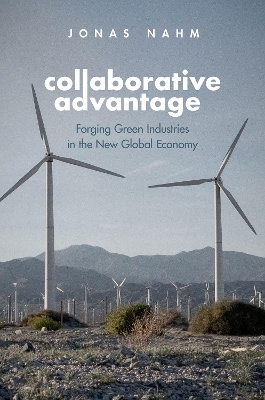
Collaborative Advantage
Forging Green Industries in the New Global Economy
Seiten
2021
Oxford University Press Inc (Verlag)
978-0-19-755537-8 (ISBN)
Oxford University Press Inc (Verlag)
978-0-19-755537-8 (ISBN)
This is an open access title available under the terms of a CC BY NC ND 4.0 International license. It is free to read at Oxford Scholarship Online and offered as a free PDF download from OUP and selected open access locations.
Collaborative Advantage offers a bold new take on the drivers and consequences of globalization, both for innovation in renewable energy industries and domestic politics.
In an era of rapid international economic integration, how do countries interact, innovate, and compete in industries, like energy, that are fundamental to national interests? In Collaborative Advantage, Jonas Nahm examines the development of the wind and solar industries, two historically important sectors that have long been the target of ambitious public policy. As wind and solar grew from cottage industries into lucrative global sectors of geopolitical importance, China, Germany, and the United States each developed distinct constellations of firms with starkly different technical capabilities. The book shows that globalization itself has reinforced such distinct national patterns of industrial specialization. Economically, globalization has allowed domestic firms to specialize in specific activities because of new opportunities to collaborate with firms from abroad. Politically, new possibilities for specialization have allowed firms to repurpose existing domestic institutions for application in new industries. Against the backdrop of policy efforts that have generally failed to grasp the cross-national nature of innovation, the book offers a novel explanation for both the causes of changes in the global organization of innovation and their impact on domestic politics. As interdependence in global supply chains has again come under fire in the wake of the Covid-19 pandemic, Collaborative Advantage challenges the notion that globalization is primarily about competition between nations, highlighting instead the central role of international collaboration in the global economy, particularly in clean energy industries critical to solving the climate crisis.
Collaborative Advantage offers a bold new take on the drivers and consequences of globalization, both for innovation in renewable energy industries and domestic politics.
In an era of rapid international economic integration, how do countries interact, innovate, and compete in industries, like energy, that are fundamental to national interests? In Collaborative Advantage, Jonas Nahm examines the development of the wind and solar industries, two historically important sectors that have long been the target of ambitious public policy. As wind and solar grew from cottage industries into lucrative global sectors of geopolitical importance, China, Germany, and the United States each developed distinct constellations of firms with starkly different technical capabilities. The book shows that globalization itself has reinforced such distinct national patterns of industrial specialization. Economically, globalization has allowed domestic firms to specialize in specific activities because of new opportunities to collaborate with firms from abroad. Politically, new possibilities for specialization have allowed firms to repurpose existing domestic institutions for application in new industries. Against the backdrop of policy efforts that have generally failed to grasp the cross-national nature of innovation, the book offers a novel explanation for both the causes of changes in the global organization of innovation and their impact on domestic politics. As interdependence in global supply chains has again come under fire in the wake of the Covid-19 pandemic, Collaborative Advantage challenges the notion that globalization is primarily about competition between nations, highlighting instead the central role of international collaboration in the global economy, particularly in clean energy industries critical to solving the climate crisis.
Jonas Nahm is Assistant Professor of Energy, Resources, and Environment at the Johns Hopkins School of Advanced International Studies.
Chapter 1: Introduction
Chapter 2: Varieties of Innovation in Wind and Solar Industries
Chapter 3: Collaborative Advantage and National Patterns of Innovation
Chapter 4: Industrial Legacies and Germany's Specialization in Customization
Chapter 5: China's Specialization in Innovative Manufacturing
Chapter 6: Wind and Solar Invention in the United States
Chapter 7: Conclusion
References
| Erscheinungsdatum | 06.09.2021 |
|---|---|
| Verlagsort | New York |
| Sprache | englisch |
| Maße | 155 x 231 mm |
| Gewicht | 363 g |
| Themenwelt | Naturwissenschaften ► Biologie ► Ökologie / Naturschutz |
| Sozialwissenschaften ► Politik / Verwaltung ► Europäische / Internationale Politik | |
| Sozialwissenschaften ► Politik / Verwaltung ► Politische Theorie | |
| ISBN-10 | 0-19-755537-3 / 0197555373 |
| ISBN-13 | 978-0-19-755537-8 / 9780197555378 |
| Zustand | Neuware |
| Informationen gemäß Produktsicherheitsverordnung (GPSR) | |
| Haben Sie eine Frage zum Produkt? |
Mehr entdecken
aus dem Bereich
aus dem Bereich
Planung · Recht · Verfahren
Buch | Hardcover (2024)
Springer Vieweg (Verlag)
CHF 89,95
Lehrbuch zu Grundlagen, Technologie und Praxis
Buch | Hardcover (2022)
Hanser (Verlag)
CHF 48,95


